Peter MALONE
Come Away
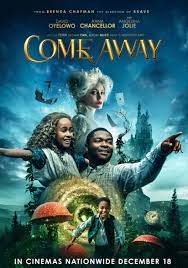
COME AWAY
UK, 2020, 93 minutes, Colour.
Keira Chansa, Jordan A.Nash, Reece Yates, David Oyelowo, Angelina Jolie, Jenny Galloway, Anna Chancellor, Michael Caine, David Gyasi, Clarke Peters, Derek Jacobi.
Directed by Brenda Chapman.
Come Away is quite a strange film, directed by American Brenda Chapman, who work in animation including such films as The Prince of Egypt. But, this is a British story. It is also a period story with elegant costumes and decor.
Audiences may be intrigued by the fantasy element of the screenplay. The focus is on a family, the parents played, unexpectedly, by David Oyelowo and Angelina Jolie. There is also an intrusive aunt, snobbish, played by Anna Chancellor. While the parents have a background, especially the father a wood craftsman who has left his family, an eccentric father, a vengeful brother, the focus is on three young children. And the focus is, initially, on their play, the make-believe world, especially imagining themselves as pirates with swordfights.
And the film visualises them as living out their fantasies as well is presenting them realistically.
As the fantasies emerge, the focus is on the story of Peter Pan, one of the young sons identifying with him, fantasising of meeting the Lost Boys, and, at the end, his father’s sinister brother becoming Captain Hook, his father’s watch and the image of the crocodile…
The young daughter, however, fantasises Alice in Wonderland stories which are also visualised, even with her mother and her aunt appearing as two of the Queen’s.
While this is attractively fanciful, there is very interesting cast which also includes guest appearances by Michael Caine and Derek Jacobi, it is something of a strange mixture, not always persuasive, perhaps bewildering to the potential young audience, perhaps irritating to the adult audience.
However, it opens up ways of imagining famous classics.
- A British fantasy? The children? The family audiences? Drawing on archetypal British fictional characters?
- The title, the adult Alice reading to her children, the poem, the invitation to imagination? The end, her looking out to the stars? The ever-presence of Peter?
- The period, costumes and decor, the family home and interiors, the gardens, the workshop for Jack, the surrounding countryside, the woods, the river? The contrast with the town, the shops, gambling, Jack’s father’s home at the pawn shop? The musical score?
- The reference to Dream Dust, children and their imagination, playing, creating, fantasy? Going beyond the real? The three children and their playing, the swordfights, the boat, the pirates? Peter and the details of Peter Pan, the lost boys, the pirates, James as Captain Hook, the watch, the crocodile? Alice, the references to Alice in Wonderland, falling down the hole, the tea party and the Mad Hatter, allusions to the Cheshire cat? Her mother as a queen, the cards? Her aunt as the red Queen?
- Audience knowledge of Peter Pan and Alice in Wonderland? Children’s knowledge?
- The family situation, Rose and her having married beneath her, Jack and his background, father, alienation from his brother, his father’s gift of the watch, his carvings, making the boat, making ends meet? The parents and the relationship, love? Love for their children? David and his going to school? Peter not doing well at his studies? Alice bonding with her brothers? The game, the sword fight, the boat, David in the water, his death, Peter blaming himself? Rose’s grief, keeping to herself, drinking, eventually smacking Alice, her regrets?
- Rose, relationship with Eleanor, Eleanor’s visits, Eleanor lecturing her, Eleanor wanting to take away Alice and educate her and refine her? Rose, the ambiguous relationship, apologising, then telling Eleanor to get out? The fact of slapping Alice, putting the drink away, bonding with Jack?
- Jack, his grief at David’s death, finishing the boat, finally taking it to Mr Brown, Mr Brown and his making alternate arrangements? Jack, upset, smashing his workshop? Peter coming in, his apologising?
- The money, Peter taking his father’s watch, their going to the pawn shop, the encounter with their uncle and their grandfather, not realising it, given the money, Peter giving it to his father, the gold fading? Their being tricked by their uncle?
- Jack, his past, considered lower class, gambling, the money, his father and his brother, the separation? Going back, meeting Charlie, playing cards? The final confrontation with his brother, the angers, the bitterness of the past, James destroying Jack’s hand?
- The family crisis, Peter and finding the lost boys, the decision to go away with them, the Dream Dust? The confrontation with Captain Hook, the fights? Sailing into the air, the Neverland? Yet his reappearing, leaving gifts, finally leaving the adult Alice with the eagle feather?
- Alice, her decision to leave the stories in the past, grow up, marry, have children, read them the stories, yet always looking for Peter?
New York Christmas Wedding, A
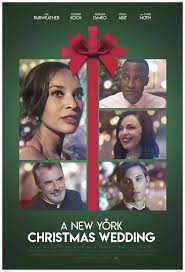
A NEW YORK CHRISTMAS WEDDING
US, 2020, 88 minutes, Colour.
Nia Fairweather, Adriana DeMeo, Chris Noth, Otoja Abit, David Anzuelo.
Directed by Otoja Abit.
At first a familiar romance (2021, d. Otoja Abit) but then a move into alternate world and a same-sex marriage drama. Two middle-aged women, friends since childhood, intend to marry and visit the parish priest of 23 years who has known them well. They discuss the possibility of marrying in the church. He is hesitant, conscious of traditions. However, at Mass, reading from I Corinthians 6 (and its severity on depraved behaviour), the congregation standing as if it were the gospel, he then invites him to sit, invites the two women and other parishioners who are in same-sex relationships on to the sanctuary. He decries condemnations and emphasises the universality of love. Some parishioners walk out. However, as a symbol, he decides to give communion to each of those on the sanctuary as a sign of love.
The priest, Father Kelly, played by Chris Noth who executive-produced the film, listens to quotations from Pope Francis on the issue, and, especially, a television clip of Pope Francis meeting one of the young men from Chile who was abused by the church and the Pope saying that his sexual orientation was the way he was born. And the priest is present for an exuberant wedding party afterwards and enthusiastic speeches.
When the central character returns to the present, she visits the Church to find Fr Kelly but is told that he was retired long since after officiating privately at same-sex weddings. It is also revealed that Father Kelly took care of the young pregnant girl, persuaded her against an abortion, assisted her in getting help. It is interesting that there are 48 comments on the IMDb blog, only two of them making reference to the Catholic church, one just noting, as an atheist, there is a Catholic context. The church and same-sex issues are not mentioned by the bloggers.
- Popular New York romantic drama? 1999? 2019? The issue of same-sex marriages?
- The New York settings, the neighbourhoods in Queens, the contrast with affluence in Manhattan? The streets, parish church, the rectory? The musical score?
- Jennifer’s story, in 1999, Gabby, Gabby and her boyfriend, the phone call, Jennifer’s demands, expectations, anger, cutting off the phone call, writing the hostile letter, the consequences, His pregnancy, giving birth, the death of the child, her grief, wandering into the traffic, her death?
- 2019, Jennifer, executive, success, engagement to David, the dinner with his parents, the demanding mother and her arrangements for the wedding? David siding with his mother? Jennifer going for the job, the cyclist and his texting, the accident, his being an armed, the revelation that he was an angel, guarding her, taking her to the alternate world in Queens?
- Jennifer and Gabby, the relationship, Jennifer with her knowledge of the alternate world, the puzzle? Gabby and her enthusiasm? Jennifer happy with the reunion with her father? Going to the parish, the discussions with father Kelly? The issue of same-six marriage? Quoting Pope Francis? The television program on the man abused in Chile and Pope Francis affirmation of his orientation? The decision for the wedding, the gathering in the church, Father Kelly and 1 Corinthians 6, his emphasis on love, getting the couples on to the sanctuary, affirming them, giving them communion? Several parishioners walking out? The support from the rest of the congregation? Changing dresses for the reception, the exuberance of the reception?
- Jennifer, the reception, encountering the angel again, sombre, his giving her the options, David appearing, Gabby and her being puzzled?
- Jennifer, weighing up the issues, the decision to stay in the alternate world, her option of where she would return to? The choosing of the original phone call, not being so harsh, Gabby leaving the boyfriend, coming to decorate the Christmas tree, Jennifer’s father, the alternate story?
- The film taking a stance on same-sex weddings, in the context of the Catholic Church?
Beckett/ 2021
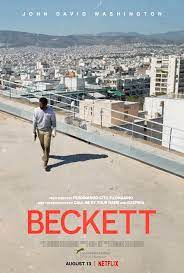
BECKETT
Greece, 2021, 108 minutes, Colour.
John David Washington, Alicia Vikander, Boyd Holbrook, Vicki Krieps.
Directed by Fernando Cito Filomarino.
Many decades ago, popular author of action adventures, John Buchan, wrote a novel about a Chase across the country, The 39 steps. And, in the 1930s, Alfred Hitchcock filmed it with Robert Donat. For those who enjoy action shows, this can be quite a popular formula.
And, it is the formula for this 21st-century pursuit. When one thinks about it, the action is probably far-fetched, a mysterious conspiracy, someone in the wrong place at the wrong time, the use of wits to elude those in pursuit, ever-present dangers. And this is definitely the case with Beckett. And, as we watch many seemingly-improbable dangers and escapes, we realise that, like life, we are victims of bad luck and appreciators of good luck.
One of the main advantages of Beckett is that it has been filmed on location in northern Greece, some spectacular photography, some landscape with grandeur, mountains, villages. There is tracking down mountains, over cliffs, through rivers, encountering local workmen, beekeepers, going to a local town, a train ride, travel by car to the outskirts of Athens, chases through the streets of Athens. No complaint about the locations and settings.
At the centre is an American businessman, Beckett, on holiday with his girlfriend, April – played by John David Washington and Alysia Vick and. The first 10 minutes has us sharing the holiday, getting to know them – and a car accident with consequences he (and we) could not have guessed. As Beckett recovers from his accident injuries (to rapidly and with not the consequences we might imagine), he revisits the site of the accident, is shot at and so begins the chase.
John David Washington is in every sequence, the success of the film depending on audiences identifying with him, his credibility in the role, his personality (which tends to be rather stern but, in the circumstances, how else might he be?
It takes some time for the audience to get to know what is happening, sharing the questioning of the American outsider who does not have the language. There is the kidnapping of a young boy. There is protest against the government and financial issues. There is a contender for the presidency. There are demonstrations.
Beckett is making for the American Embassy and, it is amazing how he eventually arrives there, having to work with one of the officials, Tynan (Boyd Holbrook) – and, by this stage, we are sharing Beckett’s paranoia even suspicious of Tynan. However, Beckett has had a lift from two activists, one played by Vicki creeps who participates in the final confrontation, a pursuit in a high-rise parking lot, a car crash, confrontation with the initial shooters back in northern Greece, the resolution of the protest, the finding of the kidnapped boy.
Prominent Australian reviewer, Paul Burns, described the film as ludicrous. In many ways, it is. But, with its action-driving momentum, the landscapes and Athens, we might put that aside for two hours and go with the flow of the pursuit.
- The title? The focus on Beckett, his situation, the conspiracy, the pursuit?
- The Greek locations, the impact of the photography, the mountains, forests and roads, farms, towns, the cities, train rides, car rides, the entry to Athens, the vistas of Athens? The musical score?
- The establishing of Beckett’s character, his relationship with April, on tour, the exhilaration, the spirit between the two? Leaving the hotel, the phone call, his drowsiness, the crash, into the house, April’s death, his getting out of the car, glimpsing the boy with red hair?
- In hospital, anxious about April, his injuries? The hospital treatment, the nurse? The police, the interviews, his statement? Wanting to phone? The chief of police, the interrogation? Reassurances? His motivation for going back to the accident scene, the bloodstains, his grief? The woman arriving, shooting at him, his wounds? The chief of police?
- The continued chases, his good luck, his bad luck? The credibility of the incidents? His stamina after the accident? Going down the cliffs, hiding, leaping, the encounter with the farmers, the kindly man, tending his wound, the attack on the house, the man being bashed? Beckett continuing, the beekeeper and his wife, the phone calls, the embassy and information? Later hearing that they had been questions and hurt? The information about the train, crossing the river, getting the town, waiting to get on the train, seated on the train?
- The chief of police, on the train, sitting next to Beckett, the struggle, his pulling the alarm, the fight with the chief, the gun, wounding the chief in his foot? The further escape?
- In the town, the posters, the boy with the red hair, discussions with the two women, activists, one suspicious, the other friendly? His story? The story of the boy? His getting into the boot of the car? The roadblock, his getting out, escaping, getting into the city? Encountering people, their help, to the American Embassy?
- How well did the film explaining the conspiracy, the government difficulties, the revolting protests, financial difficulties, the European Union? The money connections? The Mafia? The significance of the kidnap?
- Welcome to the embassy, his being helped? Meeting Tynan? Friendliness, yet the touch of paranoia (for the audience as well)? Explanations, the friendly policewoman, the drive, Tynan’s betrayal, Beckett teasing him, the escape, finding the building with the praying hands? Finding the women again, warning them? Is trying to escape, the basement, Tynan following him, the fight? Tynan about to shoot? The phone call? The assassination of the campaigner? Tynan and the explanation, American involvement, the plan? Beckett overcoming him and escaping?
- The further chase, through the streets, the activist seeing him, following him? Tynan following? The car Park, the ascent? Arriving at the top, the car with the woman and the police chief? Beckett weeping onto the top of the car, the crash? Reactions? The sounds from the boot of the car, the recovery of the boy?
- The credibility of the plot? Audience involvement with Beckett’s character, his appearing in every sequence? Identifying with him? The American, the pursuit, the wrong man?
Pandemic
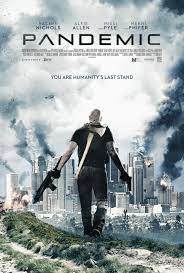
PANDEMIC
US, 2016, 91 minutes, Colour.
Rachel Nichols, Alfie Allen, Missi Pyle, Mekhi Pfeiffer, Paul Guilfoyle, Pat Healy.
Directed by John Suits.
This is not a pandemic film in the vein of Outbreak or Contagion, nor going back to the Spanish flu of the 20th century – and not in the vein of the covert 19 pandemic of the 2020 is. Rather, it is a variation on the zombie theme.
Los Angeles, 2017, the very near future from the time of the film’s release. There is mention of New York having succumbed to the pandemic. There are various headquarters in Los Angeles for the rescuing of survivors, for interning victims, various levels for studying the pandemic and its effect on the human brain, turning the victims into zombies – and, ultimately, the shooting and disposal of the worst cases. The film opens with a tour of the centre, led by hardened doctor, Paul Guilfoyle, introducing a doctor who has come from New York, Rachel Nichols. She is to command a special expedition of rescue, travelling in a bus, a former convict as driver (Alfie Allen from Game of Thrones), a navigator (Missi Pyle), and a guard who has lost his wife and is angry, symbolically named Gonna, Mekhi Pfeiffer.
The action takes place over the day, giving the opportunity to show vistas of Los Angeles, hordes of the living dead, the savagery towards each other, the threats to those not infected, many violent sequences. The group is interrupted on its mission, an attempt to save a survivor which turns into a trap to ambush the crew. When they arrive at their destination, there has been mayhem but some provisions for their survival. However, there is an attack.
At this point, there is a surprising revelation, that the doctor is not a doctor, but has taken her place and card, wanting to come to Los Angeles to rescue her husband and daughter. She confides this to the navigator who is willing to help her. The driver, who has disappeared, suddenly returns, but has been wounded and possibly infected. The rest of the film is the driving of the bus to a centre with survivors and a doctor, the doctor there recognising that the central character is an imposter, not letting them into the centre. The driver, knowing that the doctor was an imposter, agrees to help her rescue her daughter, their driving to the house, the mother finding the daughter, her husband dead in the boot of the car, the driver helping, wounded, dying. The mother desperately drives the daughter to the centre – but is deemed infected, not allowed to enter, the daughter rescued, the mother dying outside.
Many audiences have found the directing style and camera work offputting, a great deal of subjective camera work, a lot of the camera shaking, a desire for immediacy but not always persuasive.
Icebox
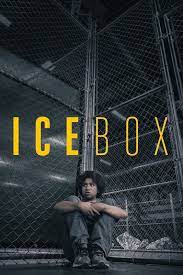
ICEBOX
US, 2018, 88 minutes, Colour.
Anthony Gonzalez, Matthew Merano, Omar Leyva, Genesis Rodriguez.
Directed by Daniel Sawka.
Icebox is a brief film, well worth seeing, especially because of its theme of illegal refugees from Central America, the response of American authorities, detention, trials and hearings. And this has more impact because at the centre is a 12-year-old boy from Honduras.
Originally, Icebox was a short film, winning awards, written and directed by Daniel soccer. And, with this feature film, two years later, he has been able to amplify his story and characters.
Interestingly, the film was released in the second year of the presidency of Donald Trump who had declared war, so to speak, on illegal refugees from Central America, urging the building of the wall. And, in these years, quite a number of children were detained, separated from their families.
Oscar is 12, is seen initially as being taken by local gangsters, attached to an branding on his chest identifying him with the gang. He escapes. He is pursued. His loving parents arrange that he get to the American border, cross it and meet up with his uncle in Phoenix.
This is a short film and the first part shows the difficulty of the journey, concealing the refugees, their buying what they might need from a shop at the border, ladders over the fence, bicycles to write to freedom. However, Oscar’s bike has a flat tire and he runs, quickly being caught by the authorities.
The second part of the film shows him in the Icebox, the detention centre, in with a great number of boys are varied ages, cold, lined up, not allowed to talk to journalists… However, they are allowed to make their phone calls but Oscars uncle is too afraid to respond.
There is some leniency with Oscar allowed to stay with his uncle, prepare for a hearing, having the aid of one of the journalists who had visited the detention centre (Genesis Rodriguez).
All the time Oscar has been trying to hide his branding, discovered by the boys and his being despised, his uncle being shocked to see it. The courtroom scene is quite harrowing, simultaneous translation, Oscar with headphones, the judge asking harsh questions, Oscar becoming more and more upset.
With Oscar deciding to escape rather than return, his uncle finds in a refuge in California. Perhaps only a temporary solution? One hopes.
- The topical theme, refugees from Central America, illegal entry, walls, guards, centres for refugees, especially children?
- A Honduras story, the family and their house, the local school and the teacher, the gangs, forcing children into the gangs, the tattoos and branding them? The consequences? Oskar and his escape, coming to see his friend at school, the shooting, is fleeing? The family organising him to go to his uncle in Phoenix? The sadness of the farewell? The phone calls, the hopes of the family to get to the United States eventually?
- An immigrant story, the American border? The group of refugees, buying help at the shop, going in the van, night, climbing the fence, the bicycles? The warning against the authorities? Oskar, the puncture in the tire, the smuggler wanting him to return to work for him? His running away, hiding? Trekking through the desert, the authorities finding him, his running, their trapping him, biting the guard, taken to the centre?
- Oskar, age 12, experience and inexperience, the blend of naive and the worldly-wise? At the centre, the officials interrogating him, his story? The promise of a trial? The phone calls, leaving the message for his uncle, his uncle not returning the calls?
- The range of children in detention, the varying ages, the boys older and bullying, the friendship with Raphael, conversations, the bullying, the cold, the shoulder at night? Raphael and his weeping, his background in Colombia, the execution of his brother? Oskar not willing to reveal the truth about himself?
- The visit of the journalist, the boys lining up, their behaviour, the warnings of the authorities not to speak? Oskar and his phone call, Perla and her standing near him, the conversation, her giving him the card? His later ringing her, requesting her to help, her stating she was a journalist, but making contact with the uncle, getting information for articles from Oskar?
- The shower sequence, Oskar and his fears, tantrum, the revelation of his branding, the reaction of the other boys, ostracising him, Raphael and his hostility? Oskar eventually explaining?
- The documents, the trial, his being given to the custody of his uncle, his uncle in the car, fearful, scared of the authorities, wanting an eventual green card? Taking Oskar, the bunk in the room, his work, Oskar in the fields and his uncle urging him back? The discussion of the documents? The uncle eventually signing? Fears of exposure from the other workers?
- Going to the trial, the shirt, tie, his uncle waiting outside, in the court, the call, the interpreter and the headphones, questions by the judge, yes and no, Oskar answering, the issues of violence, the gangs, Oskar upset, taking the headphones of, the insistence by the judge? His being condemned? Going out, to the custody of his uncle, his uncle upset, explaining his situation? Oskar wanting to run away?
- The solution, phoning his family in Honduras, his uncle in the connection in California, Oskar going there for protection, work, unable to go to school which was his desire?
- The finale, on the bus, looking at the school children, the school buildings, and the audience wondering about Oskar’s future?
Queen's Corgi, The
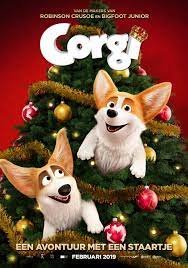
THE QUEENS CORGI
Belgium 2019,
Voices of: Jack Whitehall, Rusty Shacklefield, Tom Courtenay, Julie Walters, Jo Wyatt, Leo Barakat, Dino Andrade, Kirk Thornton, Ray Winstone, Paul Gregory, Matt Lucas, Sheridan Smith.
Directed by Vincent Kesteloot, Ben Stassen.
Everybody knows about Queen Elizabeth’s passion for corgis. Here is an imaginative variation on the theme, a Belgian animation production, British writers, and British voices.
There is plenty to entertain the younger audiences, the focus on the dogs, rivalry amongst the Royal corgis, one, Rex (voiced by Jack Whitehall) preening himself as the younger and the chosen but subject to betrayal by his rival, Charlie. Rex has various adventures, pushed into the river, rescued, sent to the pound, meeting quite a number of dogs including a bully, Tyson (Ray Winstone) and his girlfriend with whom he becomes enchanted, Wanda (Sheridan Smith). He and Wanda make a return to Buckingham Palace and a confrontation with Charlie.
There is plenty to entertain the adult audiences, the representation of the Queen, a rather tall and long-face Duke of Edinburgh who is not all that keen on the corgis, voiced by Julie Walters and Tom Courtenay. There is the Queen’s fondness for Rex, grief at his seeming death, relief at his return.
And, rather daring, perhaps, for production in 2019, but funny in retrospect, there is a visit by President Trump to Buckingham Palace with Melania. The satire in his presentation, his boxes this in the presence of the Queen, wanting to take self is, Melania wanting her dog to choose one of the British corgis as a partner, Rex chosen, biting the President at a Royal dinner, the president then splashing her Majesty with soup and his indignant withdrawal.
More humorous and telling than might have been expected.
- Everybody knowing Queen Elizabeth’s corgis, their place at the Royal Palace? The attitude of the Duke of Edinburgh!
- Belgian animation, British voice cast? The style of the animation, of the Queen the Duke of Edinburgh, of the stuffy servants at the palace, the ordinary people at the dog pound? The drawing of the dogs, realism for the corgis, the other dogs at the pound, Tyson and his bullying, the range of the other dogs, Wanda? The locations, the familiar London scenes, Buckingham Palace, interiors? The contrast with the pound?
- The voice cast, prominent British actors? The musical score?
- The story of Rex, the junior of the Royal corgis, the older corgis and their place, Charlie and his expecting to be top dog? The Queen’s attraction to Rex, spoiling him, taking him everywhere, all the souvenirs with him? The reaction of the other dogs? Rex and his getting the Royal collar? His arrogance? Charlie, befriending him, taking him for the walk, pushing him into the river, Rex surviving, rescued, the examination, going to the pound? In the cell with the street-savvy dog, the conversations, explanations, the dogs not believing Rex’s claim? The dog who never spoke, being? Sleeping? The range of other dogs, the dogfights? The levers, everybody getting out, the fights, Tyson and his domination? Rex and the attraction to Wanda? Tyson and his reaction? The mug breaking and Wanda realising Rex was telling the truth?
- The pound, life there, the cells, the meals, out in the open, the visitors coming to choose a pet? The dogs training Rex for a fight against Tyson, the comedy of the routines in his training? The final confrontation, the big dog speaking and putting Tyson down? Rex and the adoption, his escape, the return, getting Wanda, the return to the Palace?
- Rex not being let in, the guards, the hole blocked up, the newspaper, seeing pictures of his funeral? And the scenes with the Queen’s grief, searching for Rex, the remains, the funeral?
- Charlie, the promotion, vanity, lording it over the others, wanting titles? The return of Rex, the support from Wanda and his infatuation with her? The confrontation with Charlie, the souvenirs falling out of the cupboard, Charlie setting of the fire, Rex rescuing Wanda? Her being put with the balloons, the other dogs to the rescue? Rex trapped in the chimney?
- The dogs arriving, getting in, their ingenuity with the extinguishers, the phone and the jokes?
- Charlie, the ceremony, the collar disappearing? Charlie going to the room, the confrontation with the dogs? The Queen finding Rex, delighted have been back? The Duke of Edinburgh – or not?
- The portrait of the Queen, sympathetic, her love for animals? her relationship with Philip, his being in the background, the visuals of him, with the Queen, love for her, but not so much love for the dogs?
- The visit of President Trump and Melania, the satire on Trump, the selfies, protocols? The dog, Rex chosen for her, Trump and the soup and Rex biting him, his leaving in a huff? The car later returning, the American dog, taking Charlie?
- Plenty of characters and action for younger audiences? Amusement for older audiences with the life of the Royal family – and the visit of President Trump?
Empty Man, The
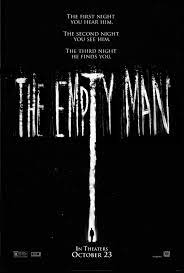
THE EMPTY MAN
US, 2020, 137 minutes, Colour.
James Badge Dale, Maren Ireland, Stephen Root, Sasha Frolova, Ron Canada.
Directed by David Prior.
This is a very strange film, science fantasy in many ways, touches of science fiction, touches of horror, touches of the supernatural. And, unexpectedly, it is quite a long film at 2 ¼ hours.
The title does not come on screen until a prologue lasting 20 minutes is complete. This prologue is very effective and could have been a short film in itself, some American hikers in Bhutan, beautiful mountain scenery, a strange episode the touches the psyche and behaviour of one of the travellers, the concern of the others but an outbreak of strange violence – the affected man having fallen down a well and then sitting, blank, in front of a skeleton image.
Then to Missouri in 2018. The focus is on a former policeman, played effectively by James Badge Dale, now running a store. He has had a relationship with a woman in the town and her daughter comes to see him, speaking strangely, and then disappearing, with mirror graffiti that: The Empty Man made me do it. There are also brochures and images of The Pontifex Institute.
On the one hand, the film is a police investigation as to the disappearance of the young woman, one of her friends telling a story about their blowing on a bottle and listening to the melody, then there disappearing, discovered hanging under the local bridge. The former policeman also finds the building of the Pontifex Institute, there are intriguing sequences of the young people there, something like a cult, the behaviour of the officials, the philosophical speech by the leader (Stephen Root) with all kinds of talk about creation, unity, emptying oneself, the image of the Empty Man.
There is a strange sequence in the hospital where the affected man from Bhutan lies in hospital, some of the young people coming and kneeling before him in the hospital.
The ending is unexpected, the supernatural, conspiracies, more worship and the former policeman emerging as The Empty Man.
- The title? The audience waiting for the explanation? The deaths, graffiti on the wall? Going to the Pontifex Institute? The philosophical and cosmic explanations? Becoming concretised at the end with James as The Empty Man?
- The prologue, 20 minutes, the trek in Bhutan, those travelling, the surroundings, Buddhist atmosphere, scenery, the bridge, Paul and the sounds, his reaction, falling down the hole, the skeletal statue, Greg and the rescue, the mysterious presence, the deaths of the travellers, the killer falling? The later discovery of Paul, anonymous, in the hospital, 23 years, the disciples coming and bowing down?
- 2018, Missouri, the town, small town, the surroundings, the bridge, the river? Homes? Streets? Downtown buildings? The Pontifex Institute? Police precincts? The musical score?
- James and his story, memories of growing up in San Francisco, police work, flashbacks to the tragedy, in his store, kind to its customers? His age, at home by himself? The past relationship with Nora? On the seat, Amanda talking with him, the mystic talk, her leaving home, the graffiti, The Empty Man, her mother’s reaction? Indication of the Pontifex Institute? James and his wanting to continue the investigations, collaborating with the local police, discussions, their knowing who he was, warning him that he was not on the force? Comforting Nora, her bringing the food, memories of the past? Amanda not knowing?
- James, going to the school, discussions with the student, in the car, her observations, telling the story, blowing into the bottle and the sound, on the bridge, the group, the dare, her perfunctory whistling? The ominous presence, the chase? Her being at home, going to the sauna, scissors and her face, suspected suicide? James, the bridge, discovering the bodies hanging under the bridge?
- James, going into town, the Pontifex Institute, the disciples sitting in rows, the young people gathering, the receptionist and her reaction, James following the group, listening to the talk by Parsons, the group applauding?
- Parsons, the philosophy of the Pontifex Institute, unity, disunity, harmony, communication in the universe? And the symbol of the open person, the Empty Man? James and his discussions with Parsons, searching the building, observing, his being ousted? The conversation with the young man outside, information about Amanda? The young man in the group, getting into the car, James following them, the hospital, seeing them in the ward and their bowing down?
- James and his own experiences, the nightmares and memories? The sense of presence, waking, the baseball bat? Indications that he had been to the Institute before?
- The hospital, investigations about the man in coma and the presence of the students, Amanda present, their talk?
- James, the strange experiences? His discovery about his life story in the archives, they created story? His being groomed to be The Empty Man? The disciples and bowing down before him?
- The blend of horror, science fiction, futuristic speculation, cosmic philosophising?
Possession of Hannah Grace, The
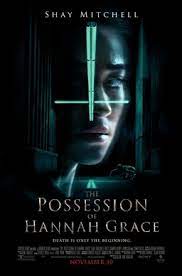
THE POSSESSION OF HANNAH GRACE
US, 2018, 87 minutes, Colour.
Shay Mitchell, Grey Damon, Kirby Johnson, Nick Thune, Louis Jeerthum, Stana Katicc.
Directed by Diederik van Rooijen.
While there is later mention of the church and exorcisms, the only section focusing on clergy and exorcisms is the prologue, two priest present, a young woman, Hannah Grace, possessed and with contortions, her disturbed father present, one of the priests held by the demonic presence and impaled on a crucifix, the other levitating and suffocating, saved only by the father actually smothering his daughter. The rest of the film is the equivalent of a kind of ghost/zombie haunting story, focusing on a former police woman who has suffered trauma and his going to job on the night shift in a morgue.
Most of the action takes place in the morgue, at night, the body being brought in that of Hannah Grace, eerie atmosphere, strange behaviour by the corpse, some grim killings, a final confrontation between Hannah Grace and her father but her killing him, the morgue attendant, however, burning Hannah Grace’s body in the furnace.
- The tradition of possession and the exorcist films? A variation? The equivalent of a ghost story?
- The Boston setting, the church and the exorcism, police precincts, the morgue, the details of the interiors, corridors, offices, shelves? The musical score?
- The prologue, the tradition of exorcism films, the possessed woman, her father, the two priests, the prayer and rituals, the priest impaled on the crucifix, the threat to the of the priest, the father killing his daughter and saving the priest?
- The transition to the Morgan police story? Megan, police career, the case and her breaking, tablets, group meetings, taking the job at the morgue, past relationship with Andi?
- Randy, delivering the body to the morgue, Megan not wanting to go out, his persuading her? The staff at the morgue, the night shift, Dave at the office, Lisa and her advice, security guards?
- Hannah Grace’s body, the wounds, the contortion, Megan examining it, the experts, explanations?
- The beginning of the eerie experiences, Megan and her imagination, the drawer opening, examining the body, the changes? The hallucination of the flies? The presences in the corridor, the surveillance footage? The discussions with Andi, the fingerprints, the drivers license, the death three months earlier? Lisa and her reassurance?
- The father, wanting to get in, the sinister presence, wanting the body burnt, the police arriving, taken away, the interrogations, his return, the confrontation with Megan, wanting to burn the body, the incinerator, his death?
- More sinister happenings, Dave, hitting the ball, the attack by Anna, her crawling around the roof, raised, his death? Lisa, her fears, going to the roof, torture and death? The latest stabbing of the security guard?
- Randy, his return, the discussions with Megan, his looking at the body, the personal story, alcoholism, photo of the child, the threats, the pathos of his being killed?
- The buildup to the confrontation between Megan and Hannah Grace, Andy and his interventions, his being saved, the fight between the two, to the incinerator, Hannah Grace and her death?
- Megan, wanting the job, her future, the issue with the pills and his accusation, Lisa allowing her to have them, surviving, her training and running, the fly – and her determination to have a full life?
Madame Claude
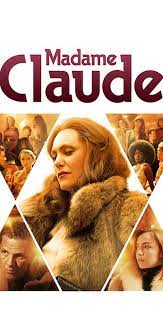
MADAME CLAUDE
France, 2021, 112 minutes, Colour.
Karole Rocher, Garance Marillier, Roschdy Zem, Lia O' Prey.
Directed by Sylvie Verheyde.
This portrait of Fernande Grundet, Madame Claude, is designed for a French audience. Other audiences will not be familiar with the character, the political background of 1968, a particular case of murder and its investigation. And, the screenplay, while alluding to these elements, does not give sufficient information and background for the non-French audience to appreciate what is going on.
This is a portrait rather than a biography of Madame Claude, her voice-over, explaining her family origins (later including sexual assault when a child by an uncle), suggestions of her work in the resistance during World War II, her determination to make something of herself, setting up an escort business, sometimes with 300 girls, and extensive clientele including politicians.
The particular period for the film is 1968, the background of Georges Pompidou as president, the stardom of a land along, the story of his bodyguard and his being murdered. There were investigations, and imprisonment for a short time of an associate of Dell and, his release and the case never having been solved.
Carol Roche a is madame Claude, her having been previously dramatised in the 1977 film, directed by Just Jaeckin (Emmanuelle) with Françoise Fabian, the title also Madame Claude.
The film gives a lot of attention to the to the socials, the girls, the guests, the drinking… But the main attention is given to a young woman who wants to be a prostitute, Sidney (Garrance Marillier, star of the horror films by Julie Ducorneau, Raw, Tatine), who tends to be an unsympathetic screen presence, rebelling against her politician father who had assaulted her when she was young, wanting to be independent yet opting for high-class prostitution with Madame Claude. She is ambiguous throughout the film, in a relationship with Claude, working as a prostitute, later having a boyfriend, wanting to murder her father, later taking him to court.
In the background of the narrative are members of the police force, friends of Claude, giving her warning about suspicions, one of her girls in a photo linked with the to long bodyguard murder. There are also politicians, discussing her, antagonistic towards her, including Sidney’s father.
Claude continues to function, but on lower key, for the next years, but eventually decides to go to the United States (a practically nothing in the film about what she did their), her deportation, trial in France, her imprisoned, eventual release. There is also a final encounter with Sydney who tells her that she has press charges against her father.
Madame Claude wrote a biography in the 1990s – but lived and in Nice until her death in 2015.
This is material that might have been amplified to affect in a miniseries rather than this dramatic dipping into so many different social and political themes.
Grace: the Possession
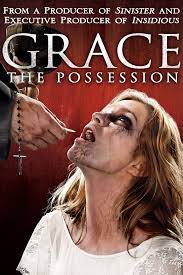
GRACE: THE POSSESSION
US, 2014, 87 minutes, Colour.
Alexia Fast, Lin Shaye, Alan Dale, Alexis Knapp, Brett Dier, Joel David Moore, Clarke Peters.
Directed by Jeff Chan.
A familiar story of diabolical possession and exorcism, set in a rather strict Catholic community (2014, d. Jeff Chan). When Grace is born, there are mysterious diabolical aspects to her mother’s experience (later revealed at the end that she had been raped by the local priest, Father John (Alan Dale). Her strict and possessive grandmother, highly judgemental about God, morality, brings Grace back from college. Grace becomes involved with the church, Father John still present, but a Deacon serving in the parish (Joel David Moore).
When grace becomes possessed, Father John and the Deacon calling in the local Bishop (Clarke Peters) and they perform the ritual, the revelation about Father John, the death of the sympathetic Bishop during the ritual, but the Deacon sacrificing himself so that the Demon will into him and liberate Grace. Grace has had a distinguishing scar on her abdomen, sign of the Demon entering her at birth. The Deacon, now the parish priest, is seen vested ready for Mass, and the audience glimpsing the diabolical scar on his wrist.
- The popularity of possession films, exorcisms? The possessed, the clergy, rituals?
- The setting of the small town, home, streets, the church (and the monastic structure of the church interior)? College, the campus, rooms, parties? The musical score?
- The title, the focus on Grace? The prologue, her mother giving birth, diabolical atmosphere, the difficult birth, her death? Helen, grandmother, taking the child? The priest present, offering absolution from sin?
- 18 years later, Grace, proper in her manner, old-fashioned dresses, going to college? (And no background what she was like as a little girl or in school.) Shy, awkward? Her room, her roommate, different in style and manner? Fiddling with her skirt? Her stomach scar? Settling in? On the campus, invited to participate in the tug-of-war, retiring to her room? In class, the encounter with Brad? The episode on the grass, asked about her virginity? The lipstick, her taking Jessica’s dress, going to the party, drinking? The emphasis on sexuality, the lecture theme?
- The subjective camera and its effect, seeing everything from Grace’s point of view, seeing her only reflected in the mirror? And the distortions?
- The episodes, her imagination, the violence, the distortions, the deaths? The behaviour of the party, her collapse?
- Returning home with her grandmother, Helen and her strict religiosity, the phone call urging to pray, God? Narrow perspectives? Taking Grace to church?
- The meeting with Father John, his stern manner, moralistic? The presence of the deacon and his talk about priesthood? His conducting the group in the parish, Grace going, her strange experience, turning seductive with the deacon, his resistance, the concern for the exorcism?
- Helen, condemnation of her daughter, likening Grace to her daughter? Audience suspecting who Grace’s father was, the information that the priest had raped her mother?
- The buildup to the exorcism, calling in the Bishop, the prayers, the rituals, the effect on Grace? Diabolical atmosphere? The knife, her killing father John? The Bishop, his death?
- The deacon, his offer to take the diabolical possession, Grace restored, the deacon as a priest, in the sacristy, invited to celebrate the Mass, the subjective point of view and the wound on his wrist?